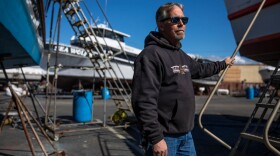-
California Gov. Gavin Newsom’s $200 million proposal to revive the state’s EV market would reach only a fraction of buyers, raising fresh questions about who should benefit and whether limited incentives can meaningfully move a slowing market.
-
Tens of millions of people are in the path of a major winter storm. Federal cuts threaten efforts to understand the causes of such weather.
-
San Diego is planning to install a new underground drainage system and pump station along Beta Street, where some of the worst flooding occurred two years ago.
-
Cheap gasoline, yes. Drill, baby, drill? Not so much. And electricity bills are going up, not down.
-
The state is reviewing draft rules for producers to make single-use packaging and food packaging recyclable and compostable by 2032.
-
Thousands of employees whose contracts end this year will lose their jobs, FEMA managers said at personnel meetings this week. The cuts could hobble the nation's disaster agency.
-
Scientists calculate that last year was one of the three hottest on record, along with 2024 and 2023. The trend indicates that warming could be speeding up, climate monitoring teams reported.
-
The fires affected millions of people in the region. It could take years to understand the health consequences, but ongoing research is helping to prepare people to weather the next fires more safely.
-
The EPA won't consider the economic costs of harms to human health, at least for now. Legal and health experts are concerned that the change could make it easier for the agency to roll back rules.
-
Wildfires last January destroyed communities around Los Angeles. Homeowners say recovery has been slowed by fights with insurers to get their claims paid.
RELATED STORIES
Sign up for our newsletters!
Keep up with all the latest news, arts and culture, and TV highlights from KPBS.
- After second Minneapolis killing, San Diego elected officials say ‘Rubicon crossed’ and ICE is ‘executing American citizens’
- This El Cajon museum takes visitors back to the frontier days of the Old West
- San Diego City Council drops plan to charge for parking on Sundays
- San Diego school board selects developers for workforce housing
- Thousands of Kaiser Permanente nurses go on strike























